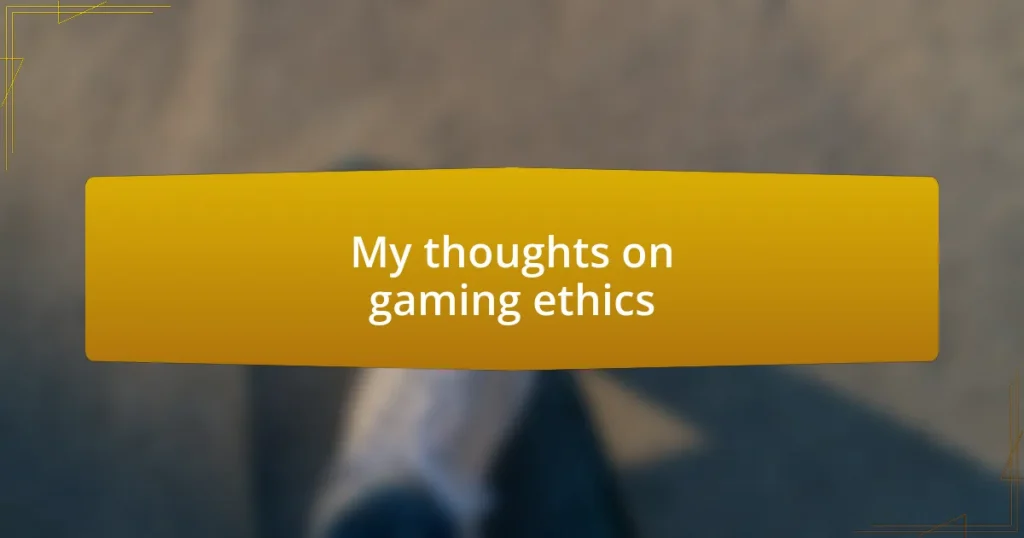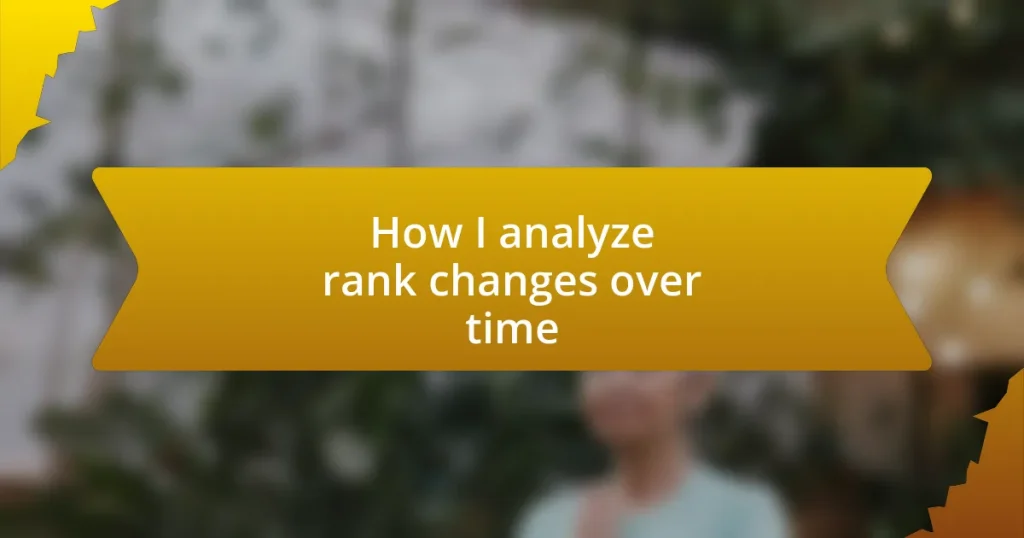Key takeaways:
- Understanding gaming ethics involves recognizing the impact of our actions on others and promotes accountability in both players and developers.
- Key ethical issues include pay-to-win mechanics, representation in games, and the effects of violent content on players.
- Developers have a vital role in shaping ethical game design and fostering inclusive, fair gaming experiences.
- Promoting a positive gaming culture relies on inclusivity, positive reinforcement, and leading by example to combat toxic behavior.
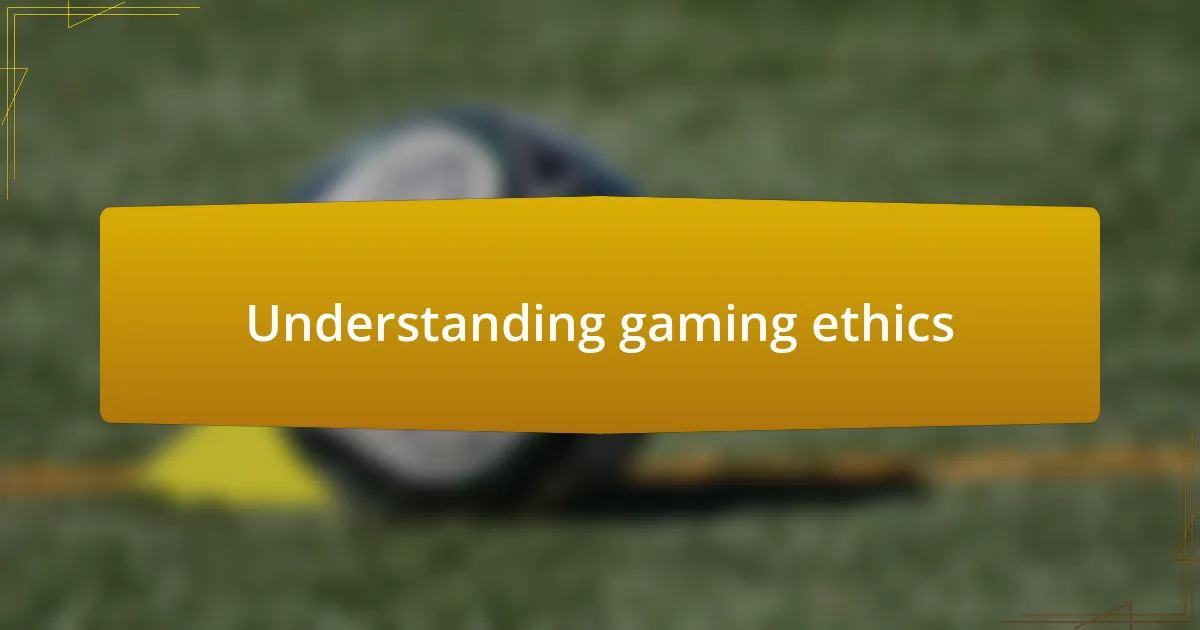
Understanding gaming ethics
Gaming ethics is a fascinating and multifaceted topic that touches upon the very essence of player interactions and the moral decisions made within virtual worlds. I often find myself reflecting on my own gaming experiences, wondering how my choices impact others. Have you ever stopped mid-game to think about the consequences of your actions? It’s a powerful moment when you realize that, even in a digital landscape, ethical considerations matter.
In my experience, gaming ethics encompasses everything from in-game behavior to the broader implications of game design. For instance, when I played multiplayer games, I noticed how toxic behavior can not only ruin the experience for others but also shape the gaming community at large. It really makes me question: should game developers take a stronger stance on fostering a positive environment? The more I engage with these issues, the clearer it becomes that ethics in gaming isn’t just a theoretical concept—it’s a lived experience, driven by real emotions, relationships, and choices.
Exploring the ethical implications of our decisions in gaming often leads to rich discussions about accountability and responsibility. The first time I encountered a situation that tested my values, I felt a mix of excitement and anxiety. Navigating these moral dilemmas forces us to confront who we are, even when the stakes seem low. I believe one key takeaway is that understanding gaming ethics can lead us to become more conscientious gamers and, ultimately, better individuals in both virtual and real-life scenarios.
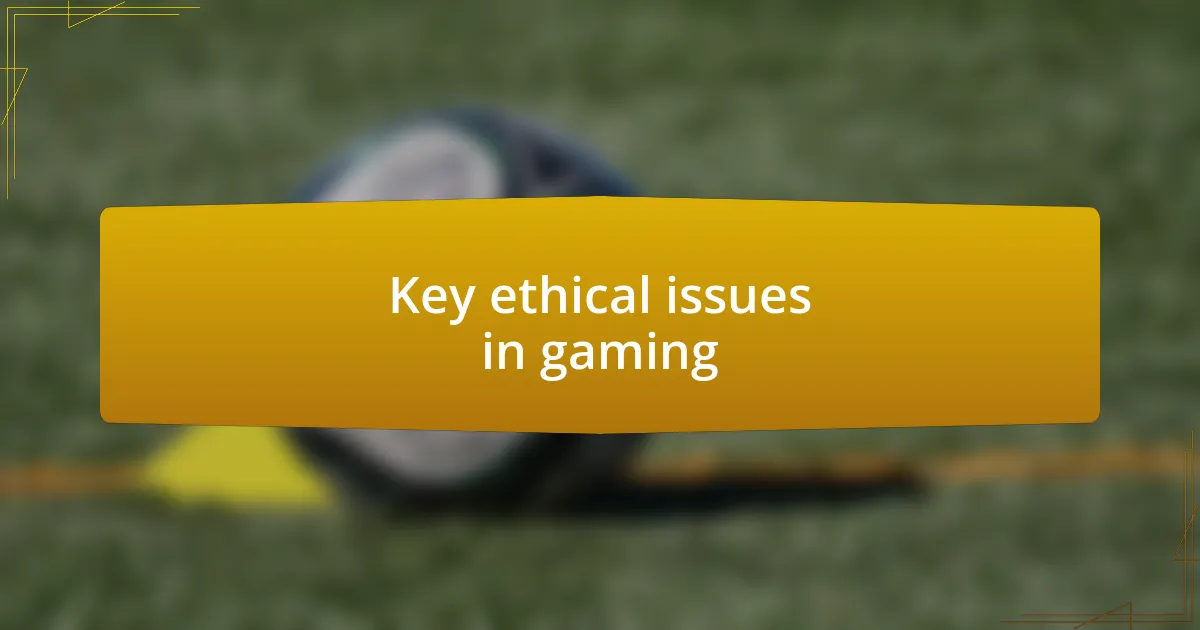
Key ethical issues in gaming
Key ethical issues in gaming span various dimensions that deeply affect players and communities. One significant concern is pay-to-win mechanics, where players can purchase advantages, thus undermining the principle of fair competition. I remember feeling frustrated during a tournament when opponents wielded powerful gear they bought, leaving me at a disadvantage despite hours of gameplay. This made me question the fairness of such systems—shouldn’t skill and dedication be the driving forces behind winning?
Another crucial issue is representation in games, particularly regarding gender and race. I’ve often played titles that feature diverse characters, but I noticed how some games depend on stereotypes that can perpetuate harmful perceptions. There was this one game I enjoyed immensely, yet it frustrated me that all the characters from my background were relegated to side roles. This realization pushed me to seek games that not only entertain but also embrace authenticity and depth in character development.
Finally, the impact of violent content on players is a recurring ethical dilemma. Personally, I’ve experienced moments where engaging with particularly violent narratives left me feeling unsettled. It made me wonder: does consuming such content desensitize us to real-world violence? As we engage with these narratives, we must consider their potential effects on our psyche and social behaviors. Ethical considerations are critical in shaping our gaming experiences and the communities we cultivate.
| Ethical Issue | Description |
|---|---|
| Pay-to-Win Mechanics | Purchasing advantages undermines fair competition. |
| Representation | Diverse characters often rely on harmful stereotypes. |
| Violent Content | Engagement with violence can desensitize players. |
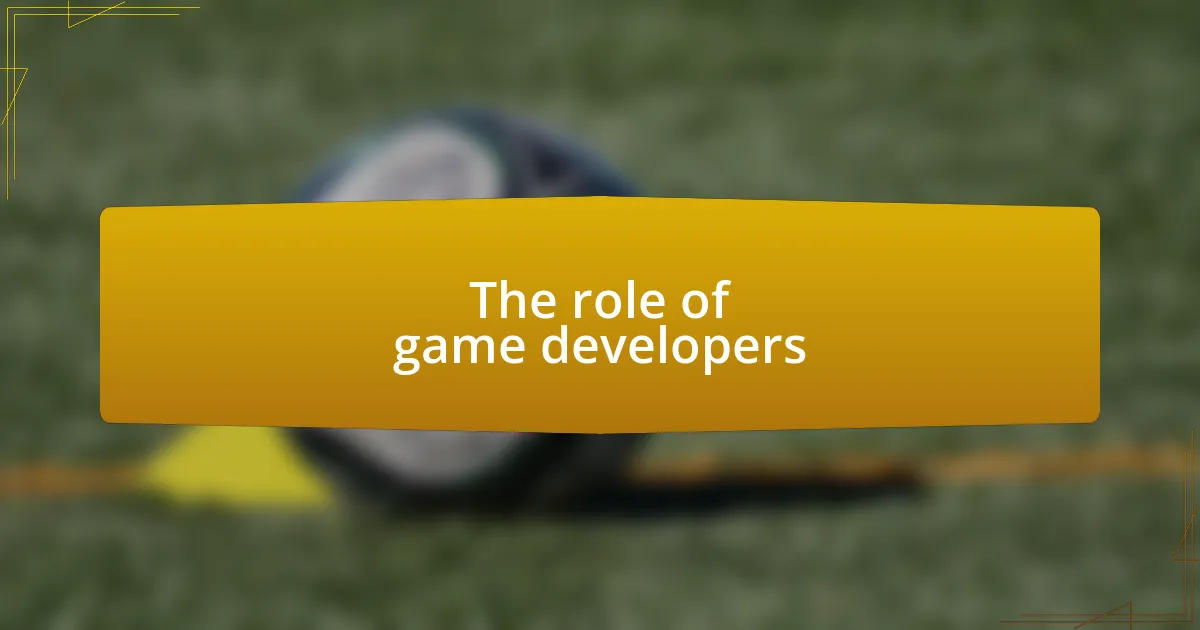
The role of game developers
Game developers play a pivotal role in shaping not only the mechanics of the games we love but also the ethical frameworks within which they operate. I remember attending a developer panel at a gaming convention where one speaker passionately articulated the need for ethical responsibility in game design. Their commitment to creating inclusive and fair experiences resonated with me, highlighting how developers have the power to influence player behavior and community standards profoundly.
- They are responsible for creating fair monetization strategies that prioritize player satisfaction over profit.
- Developers should advocate for diversity and authenticity in character creation, moving beyond stereotypes.
- Ethical considerations in game narratives are crucial in shaping players’ perceptions of violence and its context.
- They’ll often have the challenge of balancing artistic expression with societal impact, making their role vital in cultivating healthy gaming environments.
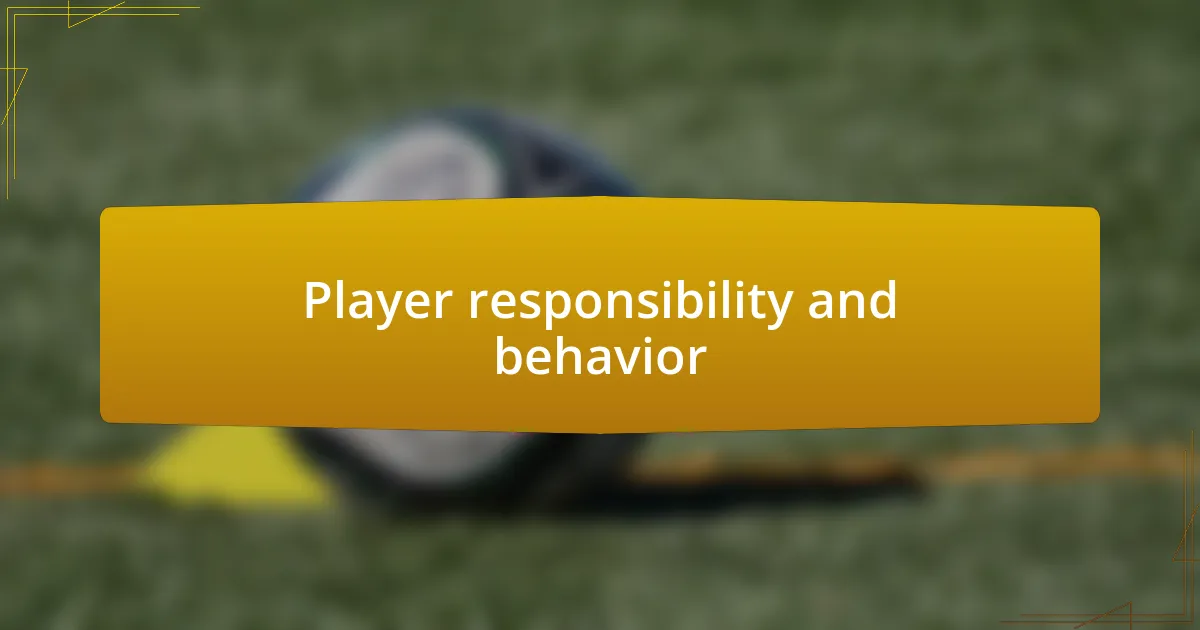
Player responsibility and behavior
It’s fascinating to think about how players shape the gaming experience just as much as developers do. I often find myself reflecting on moments when I’ve encountered toxic behavior in online sessions. It’s a stark reminder of the responsibility we all hold—not just to ourselves, but to fellow gamers, to foster a positive environment where everyone can feel welcome and valued.
When I engage in multiplayer games, I’ve noticed how my decisions can set the tone for the group. Have you ever thought about how your words or actions might affect others in the game? There’s power in being mindful of the language we use and the attitudes we adopt. I recall one time when I intervened in a heated chat to remind everyone about sportsmanship, and it shifted the mood, allowing us to enjoy the game again.
In my view, empathy is a crucial trait every player should adopt. Whether it’s understanding a teammate who’s struggling or recognizing when someone is being unfairly targeted, our behavior can either uplift or drag down the overall experience. I believe that when we take a moment to consider how our actions impact others, we not only enhance our own gameplay but contribute to a healthier, more respectful community.
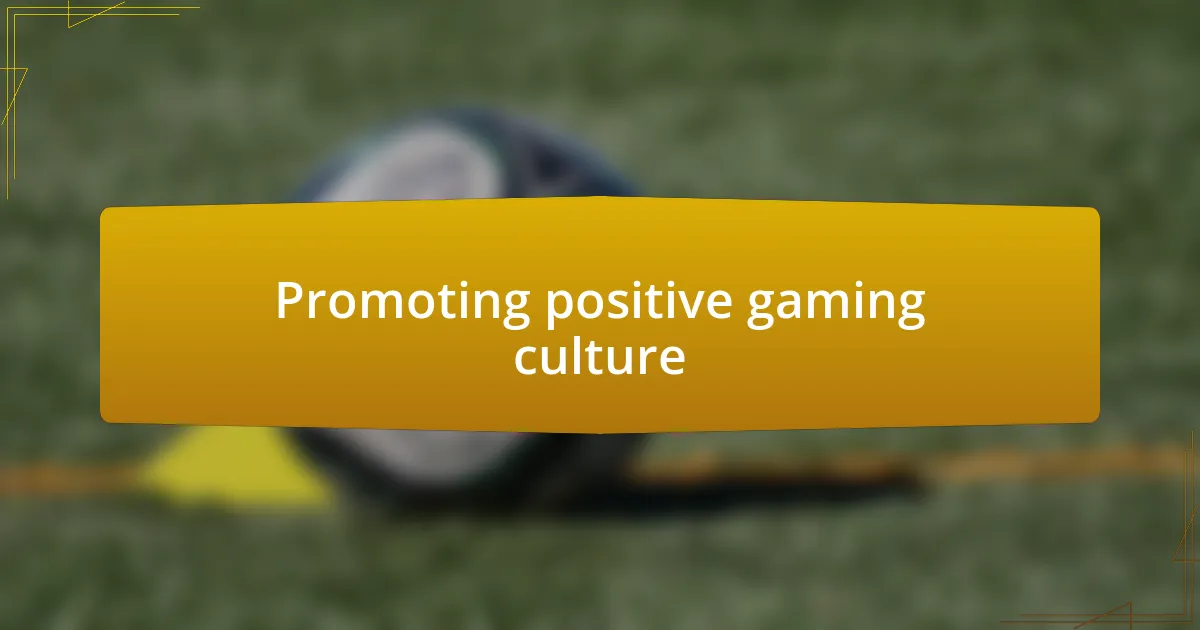
Promoting positive gaming culture
One of the most effective ways to promote a positive gaming culture is by celebrating inclusivity. I distinctly remember joining a group that encouraged all players, regardless of skill level, to participate in community events. The atmosphere was electric and welcoming, proving that when we lift each other up, everyone benefits. Have you experienced that sense of belonging while gaming? It can make a world of difference.
Another key aspect is the power of positive reinforcement. I’ve found that acknowledging a teammate’s good play can instantly boost morale. Recently, during a particularly tough battle, I complimented a player for an excellent tactic, and not only did their performance improve, but the whole team vibe shifted to a more cooperative spirit. How often do we take a moment to appreciate one another in the heat of competition?
Finally, leading by example is paramount in fostering a respectful gaming environment. I recall a time when I witnessed a player being berated for a mistake. Instead of joining the negativity, I publicly supported them, which encouraged others to do the same. It made me think: what if every gaming session started with a commitment to respect? Making that shift is as simple as taking a stand against toxicity, reminding us that we all share the same digital playground.

Future trends in gaming ethics
As I look at the future of gaming ethics, I can’t help but think about the role of technology in promoting responsible gaming behavior. For instance, I’ve noticed a surge in AI moderation tools that help keep chat environments safe and welcoming. When I reflect on my experiences with online interactions, I feel hopeful that these technologies can be allies in reducing harassment and ensuring a more inclusive space for everyone.
Another trend that intrigues me is the shift towards transparency from game developers regarding microtransactions and loot boxes. Understanding these mechanics is essential, as I’ve sometimes felt frustrated by unclear pricing models. When game companies adopt more honest policies, it not only builds trust but also empowers players to make informed choices—an approach I believe is essential for ethical gaming.
Looking ahead, the conversation around mental health and gaming will undoubtedly grow. In my own journey, balancing gaming with life’s demands has been a challenge. As more developers introduce features to promote well-being, I wonder how this will reshape our gaming habits and community interactions. It’s an exciting prospect that could lead to healthier relationships with our favorite pastimes.










